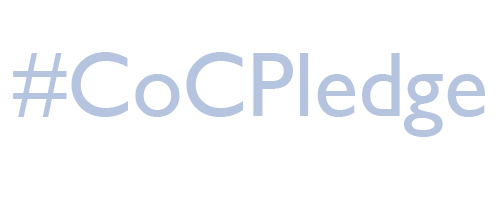#CoCPledge – A Way Forward?

The #CoCpledge is a simple idea – pledge not to speak at conferences that don’t have a code of conduct established – that seems like a great step toward more fair and responsive treatment of all kinds of people at conferences. The pledge is perhaps more powerful when it comes from higher profile speakers (many of whom, like our own Rebecca Watson, have required harassment policies from the cons they speak at for years). But it’s important as a marker of effort. It’s not just about the code of conduct’s content, although there are many resources and examples out there to draw from. It’s about recognizing that the way we treat others is important, and deserves as much careful consideration as anything else in a conference agenda.
I’ve never put on a conference, personally – but I’ve been peripherally involved in the production, and just from being on the sidelines I can tell it’s a ton of work. How would it feel to have all of that work, and all of the amazing ideas put forth on your stage, overshadowed by a couple of jerks? Probably not great for anyone involved. It’s easy to want to put the focus of a conference on the content – and that’s where it should be. But that’s exactly why conferences need a code of conduct – so it’s clear how people are expected to behave, and clear what to do when someone steps out of line. Because that someone or someones is not just directly harassing a single individual, but damaging the conference’s ability to be constructive and educational for many others as well.
Jacob Kaplan-Moss is a vocal CoC advocate who explains the need for one well:
A very small minority of conference attendees are behaving in ways that are far over the line. Pretending that your conference or your community is somehow immune is naive at best… The code of conduct, then, exists for everyone else — those fundamentally good people.
But while a code of conduct is a great step, it alone is not enough. Remember Adria Richards’ experience last year at PyCon? That’s a conference with a Code of Conduct, but the backlash against Adria came from all sides – not just the conference itself – indicating that a code of conduct is just the beginning. While it’s important that everyone understand the need for a code of conduct, it’s also important that people commit to behaving in line with them.
As Ashe Dryden (who seems to have inspired the #CoCpledge movement) points out, “I worry about the conferences that are adopting codes of conduct without understanding that their responsibility doesn’t end after copy/pasting it onto their site.” Codes of conduct don’t just exist – they need to be enforced, and not just by organizers, but by the entire community. We’re all a part of this, which is why a pledge is important. And if a conference doesn’t have one – “sometimes asking is all it takes.” It’s more about the willingness to understand and negotiate than the state of having had a CoC from the beginning of time.
So, are you taking the #CoCpledge? Do you think it’s necessary? Why or why not?





I totally agree that having a code of conduct is necessary for putting on a good, informative conference. It’s like when you want to photograph or present artwork… you put it on a plain white wall or plain white/black matting, so that the viewer can focus on just the piece and not what’s going on around it. Code of conducts are just matboard for conventions, a structure in place to keep out distractions like fear and stress from harassment while people focus on the real content.
Also yes, I’d agree it’s less about everyone starting off with a CoC from the beginning and more being receptive to gaining one. Especially for new cons that aren’t social justice oriented, I can see honestly just not thinking of a CoC the first time around until someone says something. I mean, I would imagine there are a kajillion things to consider when setting up a con.
So yeah. I’d take the pledge, though I’d think in a more “refusing to attend non-CoC conventions” sense than a speaking sense.
I’m at a point in my life where I’m interested in getting back into going to conventions (both tech and non tech), and as an attendee I have zero interest in attending a con that doesn’t have a solid Code of Conduct. Further, I do my research. There’s a con in my area every year that has a decidedly lackluster CoC that I suppose could be considered minimally adequate, but they also have a well earned reputation for not enforcing even the minimal standards outlined there and are very very predator friendly. It’s sad, because I have good friends who work on it and always encourage me to attend and I simply am not willing to do so and tell them precisely why.
As noted above, having rules isn’t enough. If the people attending know that the rules will be ignored and they can get away with pretty much anything short of public rape then the rules are pointless.